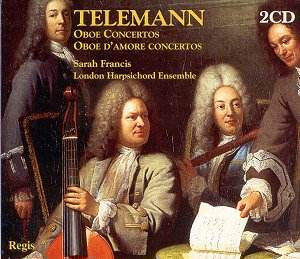I can never listen to Telemann’s music without recalling
a commentator some years ago saying that Telemann wrote too much music
and far too hastily. Sure, Telemann was no great musical innovator but
was certainly most influential, prolific and extremely well esteemed
by his world famous contemporaries Handel and JS Bach. He wrote for
virtually every solo instrument available in his day and for various
multiple combinations too. However, the lack of memorable melodies in
Telemann’s compositions is generally acknowledged as his main drawback.
In this Regis double CD set, which comprises eight
oboe concertos, three oboe d’amore concertos and a triple concerto,
all undated, Telemann displays his most gracious style of composition
that embraces the finest of the rococo traditions. I recall how well
this set was regarded when it was originally released on the now defunct
Unicorn Kanchana record label.
Telemann wrote a dozen or so concertos for oboe and
string orchestra, eight of which are included on this release. Particularly
notable is the concerto in D major on Vol. 1 titled ‘concerto gratiose’
with its attractive pastoral character and fine adagio where
the amorous oboe sits so comfortably on the Vivaldian style accompaniment.
Telemann composed at least 22 works featuring the oboe
d’amore, an instrument that was extremely popular in mainly German speaking
countries between 1720-1760. Three of the concertos are contained here
together with a triple concerto that includes the oboe d’amore. Telemann’s
attractive solo concertos for this rarely used instrument sympathetically
display the available range of colour and contain some most expressive
writing that exploits the instrument’s best features.
A real discovery and the undoubted gem of this set
is the triple concerto for the unusual combination of oboe d’amore,
flute and viola d’amore. The concerto, which is a substantial work of
18 minutes, is not merely a virtuoso display piece. Neither should it
be judged simply for curiosity value as it contains some serious and
appealing musical ideas. It is a fascinating, melodious and satisfying
piece with episodes of real serenity. At times I can hear echoes of
Handel’s ‘Zadok the Priest’ and the main theme from Geoffrey Burgon’s
1980’s score from the classic TV series ‘Brideshead Revisited’.
Oboe and oboe d’amore soloist, Sarah Francis is an
extremely gifted player. Her performances are certainly stylish, ravishing,
in fact, displaying a marvellously ripe timbre with considerable technical
finesse. Francis also directs the ensemble with excellence making a
most persuasive case for these works. Using modern instruments, the
playing of the London Harpsichord Ensemble is equally as fine and they
really seem to relish playing this repertoire for which they are well
suited.
Although I have a passion for period instrument recordings,
I was captured by the quality of these polished and enjoyable performances.
Combined with a rich, well-rounded and superb digital sound quality,
few listeners will be disappointed with this release.
Michael Cookson

